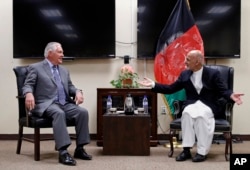Afghan President Ashraf Ghani, on a visit to New Delhi, praised the role outlined for India in Washington’s new South Asia strategy, which calls on New Delhi to help bring economic stability and development to the war-torn country.
Calling the strategy a “game changer” during a speech at a research organization in the Indian capital, Ghani said it was a tribute to New Delhi that Washington had “singled out India in this new engagement.”
During talks in New Delhi, the Afghan leader and Indian Prime Minister Narendra Modi expressed a "firm resolve” to end the menace of terrorism, and they also emphasized the need to close cross-border sanctuaries to terrorism, according to an Indian Foreign Ministry statement.
The Afghan leader later said Pakistan has come to a key juncture and needs to make a choice, as he referred to accusations the country provides safe havens to terror groups.
India and Afghanistan also reviewed a new development partnership launched last month under which New Delhi is creating 116 new projects in the country, in areas such as health, agriculture and education. The foreign ministry said they are a “significant step” in building on cooperation between the two countries.
The new projects are part of a longstanding partnership with Afghanistan, under which India has given the war-torn country about $2 billion in aid.
New Delhi, which has trained Afghan defense and security personnel, told Ghani it is ready to extend further assistance, depending upon the needs of Afghan forces.
Ghani’s visit to New Delhi came a day after he met U.S. Secretary of State Rex Tillerson, who made a brief, unannounced stop Monday in Kabul during his ongoing tour of Asia and the Middle East.
While in Kabul, Tillerson said New Delhi is providing important economic activity and that “we think they can be a very positive influence on creating the right environment for the future of Afghanistan.”
One of the issues on the table Wednesday when Tillerson is scheduled to meet with Indian leaders will be the enhanced role Washington envisions for New Delhi in bringing economic stability to Afghanistan.
The focus of the talks between Tillerson and Indian leaders will not be restricted to South Asia, however, as both India and Washington seek to build on growing strategic ties.
Washington has said it wants to “dramatically deepen” cooperation with New Delhi and that it sees India as playing a key role in stabilizing not just South Asia, but the Indo-Pacific region.
In a speech last week, Tillerson said India and the U.S. serve as "the eastern and western beacons" for an “international rules-based order, which is increasingly under strain.”
The U.S. is seeking a growing partnership with India, with an eye on balancing an increasingly assertive China, according to analysts.





